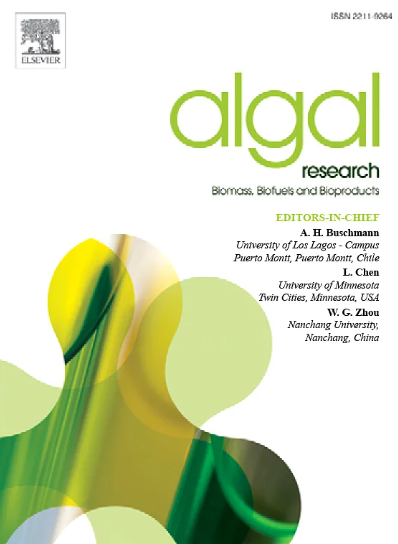Effects of different drying methods on the nutritional components, microstructure, and metabolomic profile of Spirulina maxima
IF 4.6
2区 生物学
Q1 BIOTECHNOLOGY & APPLIED MICROBIOLOGY
Algal Research-Biomass Biofuels and Bioproducts
Pub Date : 2024-11-04
DOI:10.1016/j.algal.2024.103788
引用次数: 0
Abstract
Spirulina maxima (S. maxima) is considered a potential solution to address the issue of human food security. In this study, three drying methods were employed: spray drying (SD), freeze drying (FD), and vacuum drying (VD), to process fresh S. maxima (FS). A comprehensive nutritional evaluation was conducted using principal component analysis and cluster analysis, along with an untargeted metabolomics study. The results indicated that after SD, FD, and VD treatments, the phycocyanin content decreased by 23 %, 9 %, and 80 %, respectively, compared to that of the FS. The polysaccharide content also significantly decreased by 36 %, 33 %, and 67 %, respectively. Comprehensive analysis showed that SD resulted in the least loss of nutritional indicators in S. maxima. Further metabolomics analysis revealed that prolonged exposure to high temperatures can lead to metabolic disruptions in 2-oxocarboxylic acid metabolism, purine metabolism, amino acid biosynthesis, and starch and sucrose metabolism. Additionally, the levels of coproporphyrin I and coproporphyrin III increased which ultimately led to a decrease in chlorophyll and phycocyanin contents. Therefore, VD resulted in the poorest quality of S. maxima. This study provided a theoretical basis for the quality assessment of S. maxima in response to drying.
不同干燥方法对最大螺旋藻营养成分、微观结构和代谢组学特征的影响
最大螺旋藻(S. maxima)被认为是解决人类食品安全问题的一种潜在解决方案。本研究采用了三种干燥方法:喷雾干燥法(SD)、冷冻干燥法(FD)和真空干燥法(VD)来处理新鲜的最大螺旋藻(FS)。利用主成分分析和聚类分析以及非靶向代谢组学研究进行了全面的营养评估。结果表明,与 FS 相比,经过 SD、FD 和 VD 处理后,藻蓝蛋白含量分别减少了 23%、9% 和 80%。多糖含量也分别大幅减少了 36%、33% 和 67%。综合分析表明,SD 导致的 S. maxima 营养指标损失最小。进一步的代谢组学分析表明,长期暴露在高温下会导致 2-氧代羧酸代谢、嘌呤代谢、氨基酸生物合成以及淀粉和蔗糖代谢紊乱。此外,共卟啉 I 和共卟啉 III 的含量增加,最终导致叶绿素和藻蓝蛋白含量下降。因此,VD 导致 S. maxima 的品质最差。这项研究为根据干燥情况评估 S. maxima 的质量提供了理论依据。
本文章由计算机程序翻译,如有差异,请以英文原文为准。
求助全文
约1分钟内获得全文
求助全文
来源期刊

Algal Research-Biomass Biofuels and Bioproducts
BIOTECHNOLOGY & APPLIED MICROBIOLOGY-
CiteScore
9.40
自引率
7.80%
发文量
332
期刊介绍:
Algal Research is an international phycology journal covering all areas of emerging technologies in algae biology, biomass production, cultivation, harvesting, extraction, bioproducts, biorefinery, engineering, and econometrics. Algae is defined to include cyanobacteria, microalgae, and protists and symbionts of interest in biotechnology. The journal publishes original research and reviews for the following scope: algal biology, including but not exclusive to: phylogeny, biodiversity, molecular traits, metabolic regulation, and genetic engineering, algal cultivation, e.g. phototrophic systems, heterotrophic systems, and mixotrophic systems, algal harvesting and extraction systems, biotechnology to convert algal biomass and components into biofuels and bioproducts, e.g., nutraceuticals, pharmaceuticals, animal feed, plastics, etc. algal products and their economic assessment
 求助内容:
求助内容: 应助结果提醒方式:
应助结果提醒方式:


